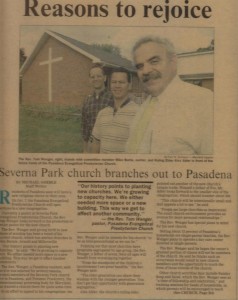Here is an article written by Wendy Lankford of MissionICare. Wendy and her husband Shane will visit Pasadena EP Church on Sunday, January 20 to discuss their work connecting churches to opportunities to care for orphans, widows, and vulnerable children.
Her tired, chapped face appeared contented as she rolled through baggage claim in her new umbrella stroller with her exhausted, relieved, and overjoyed parents. Little Lina had endured a 2 hour car trip from her orphanage to the nearest major city, a 12 ½ hour train ride to Moscow, and a 10 ½ hour plane ride to Baltimore. Lina has Down Syndrome and her adoptive family found her through Reece’s Rainbow, a non-profit organization that advocates for special needs children around the world. Amy and Mike Livingston, her adoptive parents, were among the American families to take placement of one of the close to 1,000 Russian children welcomed into American homes last year.
How should we react to Russian President Vladimir Putin’s recent signature of a bill effectively eliminating American adoptions of Russian orphans like Lina? How should we respond to the disruption of the 46 nearly finalized U.S. adoptions of Russian children? How can we take action when it appears that American hands are tied?
While the immediate implications are significant and disheartening for Russia’s more than 650,000 orphans waiting for families, the possibly hundreds of American families seeking visas for immigration of Russian orphans, as well as thousands more who might consider Russian adoption in the future, there are three things we, believers called to care for the orphan, must remember:
First, the media focus on the Russian orphan crisis may bring needed attention to the plight of orphans in Russia, as well as orphans worldwide. Observers have credited the impetus for Russia’s new legislation as politically-motivated retaliation against the The Magnitsky Act, an act signed into law by President Obama in December to impose restrictions on Russian human rights violators. However, in its efforts to react to American foreign policy, and in its willingness to use its own children in an act of political retribution, Russia has effectively turned the spotlight on its own domestic policies and priorities . In a Christmas address, the head of the Russian Orthodox Church, Patriarch Kirill appealed to congregants. “And as we celebrate Christmas I would like to appeal to everyone with a request: If you can take this important step in life aimed at adopting children, supporting orphans, take this step,” Kirill said. “There should be no orphans in our country.” The media exposure of Russia’s overburdened orphanage system, which is acknowledged by American and Russian adoption agencies alike, as well as by Russian legislators, could result in a greater legislative emphasis on non-institutional and family-based solutions domestically for Russia.
Secondly, the shift away from American “solutions” allows us to focus on and support the growing efforts by Christian Russian nationals to stem the tide of the orphan crisis. In April of 2012, The CoMission for Children at Risk and the Russian National Network for Children at Risk partnered with other Russian organizations to host The Alliance for Russia Without Orphans in an effort to cultivate a culture of orphan care. This Christian summit provided information and helpful resources to prepare Russian Christians to care for the most vulnerable in their country. Organizations like the Risk Network, provide resources to the Church to meet the needs in the community. The Russian Orphan Opportunity Fund is an organization that helps orphans in orphanages and prepares them to transition by giving them life skills. We can use this opportunity to begin to pray for, partner with, and financially support Russian domestic ministries that are caring for orphans in Christ’s name.
Finally, as Christians, the uncertainty and powerlessness we are tempted to feel in response to perceived setbacks can be potent reminders that our Sovereign Creator God is the same God in Russia that He is in America. While we cannot dictate the foreign policy direction taken by Russian leaders, we know that “the king’s heart is in the hand of the Lord.” And while we cannot control the fate of the many vulnerable Russian children waiting for homes, we know that our God “hear[s] the cry” of the orphan. God has not forgotten about the Russian orphans, and His church is alive and working on behalf of the fatherless. We need to create partnerships with Russian churches to serve them as they live out the biblical mandate to care for the fatherless. We must pray and look for practical ways to help our brothers and sisters in Russia. Russia’s new orphan care legislation is a great limitation, humanly speaking, but it does not limit the power and passion of our God, “the Father to the fatherless,” for the orphan.




 This Sunday Pastor Tom preached a sermon on 1 Peter 2:4-6 entitled
This Sunday Pastor Tom preached a sermon on 1 Peter 2:4-6 entitled 